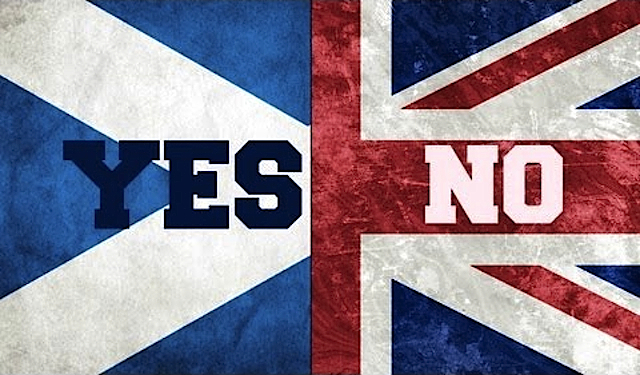
Even up until early August, it seemed that the Pro-Unionist ‘Better Together’ Campaign (a cross-political grouping including the Conservatives, Labour and the Liberal Democrats) had it all wrapped up.
The ‘No’ side of the Scottish Independence referendum had a solid lead of up to 20%. Against all expectations, the unexciting leader of the Unionist campaign (and former British Chancellor of the Exchequer), Alistair Darling, had defeated the charismatic Nationalist Leader (and current Scottish First Minister), Alex Salmond, in their first head-to-head debate, mainly by asking difficult questions in relation to currency – Salmond favours keeping the Pound Sterling, despite the last that all the major parties had ruled out sharing the currency with an independent Scotland.
The Scottish Independence bid looked doomed to enter the History books as a dismal failure, akin to the ill-fated Scottish Devolution referendum in 1979.
However, as the Fat Lady was starting to warm her tonsils, something amazing happened. In the next debate (25 August), Salmond absolutely trounced Darling, and reassured Scottish voters that a ‘Yes’ vote would give him the “mandate” to negotiate with the rest of the UK in relation to the usage of the pound.
This, combined with blunders by the ‘Better Together’ Campaign (including an ad aimed at undecided female voters which spectacularly backfired due to it’s alleged sexist undertones) started to turn the tide for ‘Yes Scotland’ (the Nationalist campaign group). The gap narrowed, and on the 7 September(Sunday), a poll gave the Nationalists a narrow 51%-49% lead, once undecideds were excluded.
The panic was evident almost instantly. ‘Ten Days to save the Union’ was splashed liberally on the headlines of the English press. Within hours, senior figures from the Unionist campaign – most notably former Labour Prime Minister, George Brown – was promising the Scots the promise of more autonomy (known as ‘Devolution Max’) if they decided to stay in the Union.
This was after the postal voting had already being completed, and a U-Turn for much of the Unionist leaders. Few Scots would have disagreed with the Nationalist’s assessment of these actions as a desperate last ditch effort to beat back the Yes campaign just before the day of reckoning on 18 September.
Two more recent polls at the time of writing put the No campaign on a 5-6% lead, but this unique referendum is becoming impossible to predict. 16- and 17-year-old Scottish residents have a vote in this referendum – a first for any public vote on these islands.
The referendum has attracted huge interest among the general public in Scotland, with discussions concerning the poll infecting all areas of society, from the supermarket to the local pub. There was a huge surge in applications to get on the voting register in time for the vote, and turnout is predicted at a whopping 84% – a massive increase on the turnout for the Scottish parliament elections in 2011, which was 50%.
The Nationalist campaign has one critical advantage over it’s Unionist rival – while the ‘Better Together’ campaign focused almost exclusively on the supposed disasters that await an Independent Scotland, which has been widely dubbed as ‘Project Fear’, ‘Yes Scotland’ has almost being as aspirational and as optimistic as the ‘No’ campaign has being fear-ridden and pessimistic.
While Salmond’s promise of a fairer and more prosperous Scotland (funded partially by Scotland’s sizable Oil reserves) has attracted criticism for being supposedly unrealistic, it is a hopeful message that many Scots have responded to positively – and is aimed especially at previously disillusioned voters who now plan on voting in this referendum, and want to shake up the status-quo.
Deeply unpopular welfare reforms enacted by the Conservative-Liberal Democrat coalition in London, alongside the fear of creeping privatisation of the British National Health Service (NHS), as widely revered as our own HSE is widely despised, has also provided a boon for the Nationalists.
The Scots tend to be much more Left-leaning than the English, and the Conservative have being reduced to almost fringe party status North of the border. Therefore, many Scots respond positively to the idea of an independent Scotland where they always get the government they want, as opposed to the one that the English people want to impose on them.
Past experience with such referendums – notably the Quebec independence referendum of 1995, which was defeated by a margin of less than 1% – indicates that Scotland is still likely to opt to remain in the UK, if only for the fear of the unknown.
However, with unprecedented turnout levels expected, and the unique nature of such a referendum, you would either have to be brave or stupid to call the outcome of this close-run Independence bid on 18 September.
By Tomás M. Creamer